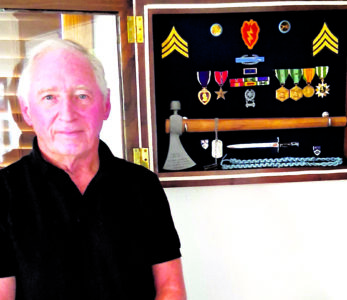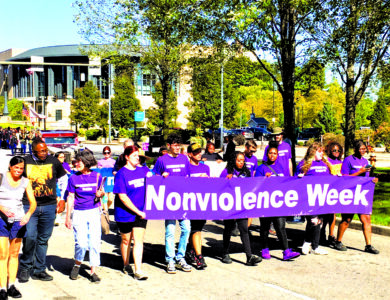Poland Army veteran recalls intense warfare in Vietnam

David Thornton stands next to a display case showing his sergeant stripes, 25th Infantry Division insignia, ribbons, medals and other memorabilia from his Army service in Vietnam.
POLAND TOWNSHIP — When a visitor to David Thornton’s home reached out to shake hands good-bye, Thornton slyly slipped a medallion into his palm.
The hefty, oval-shaped, gold plated medallion was from the Military Order of the Purple Heart, and on the back it bore the following quotation from Gen. Douglas MacArthur:
“The soldier, above all other people, prays for peace, for he must suffer and bear the deepest wounds and scars of war.”
MacArthur spoke those words on May 12, 1962, when he addressed United States Military Academy cadets at West Point in a speech still regarded as one of the pinnacles of military oratory.
It is a deeply personal message for Thornton, who not only witnessed the ravages of war in Vietnam, but also suffered its wounds and scars in a mortar attack. Now 77, he still carries more than a dozen shrapnel fragments throughout his body.
Thornton grew up on Youngstown’s East Side, graduating from East High School in 1966. As a youngster, he said, “We were always playing out in the woods and stuff,” which years later paid dividends, especially on night missions when “I was careful not to be stepping on twigs or anything” that could give away their position to North Vietnamese Army regulars.
After graduation from East, Thornton went to work for railroad tank car manufacturer GATX in Masury. Meanwhile, the U.S. was deploying approximately 400,000 military personnel to Vietnam and the 1967 Draft Act was enacted to meet the burgeoning demand for military personnel.
“I never paid too much attention to (the war). I always figured what happens, happens. I believed in fate,” said Thornton.
Fate was delivered to his mailbox on May 7, 1968, in the form of a U.S. Selective Service draft notice.
“When I got drafted, it was the biggest draft of the war,” he said.
Thornton said goodbye to his family in Youngstown and his friends in Masury and shipped off to Fort Jackson, South Carolina, for eight weeks of basic training followed by another eight weeks of advanced infantry training.
“We had only two or three weeks of jungle training. That was it,” he said.
Thornton explained that with the U.S. still in the throes of the Cold War with the Soviet Union, concerns of a ground war in Europe were still high and therefore a relatively limited amount of time was devoted to preparation for fighting in the southeast Asian climate.
“We had two climates: rain and heat,” Thornton said with a chuckle. “The rainy season was ending when I got there, but then the hot, hundred degrees season started (a month or two later).”
Thornton arrived in Vietnam attached to Company A of the 25th Infantry Division in October 1968 as bitter fighting continued in the aftermath of North Vietnam’s Tet Offensive launched eight months prior. Tet — a shortened name for the Vietnamese lunar new year — was a major coordinated attack by the north against American and South Vietnamese forces in more than 100 cities and towns in the south.
It was the primary job of the 25th Infantry Division to protect the South Vietnamese capital of Saigon (now Ho Chi Minh City) and neutralize the incursion of military personnel and materiel coming in off the so-called Ho Chi Minh Trail, an intricate network of supply roads and trails that splintered off like veins and arteries into the south from North Vietnam through neighboring Laos and Cambodia.
Thornton, then 20, was in the thick of it, fighting in a theater of operations about 50 miles northwest of Saigon near the Vietnamese town of Tay Ninh and not far from the Cambodian border that ran to the west and north.
Fighting in the region was part of daily life. Mortar attacks were common, especially at meal time.
“The Army eats at 5 o’clock. That’s it,” said Thornton. “The enemy knew that, so we’d always get mortared.”
Thornton had just returned from a patrol in an armored personnel carrier (APC) when a mortar round hit near where he and a buddy were standing. The APC’s large rear door was still open, and the force of the blast blew Thornton and his buddy through the opening and into the APC. Even with wounds to his arms, legs and back, he managed to find a portable radio for the lieutenant who ran into the APC to call for help.
Thornton got evacuated to Tay Ninh, nearly sliding off a bench and out the door of the helicopter enroute.
“The door gunner said he was watching me and grabbed me (before I fell out),” Thornton said with a laugh. “He said I didn’t look good.”
Thornton’s buddy survived and was sent stateside, but Thornton spent three or four weeks amid mortar showers in Tay Ninh and then asked to go back to his unit.
“The first sergeant thought I was nuts, but I told him I missed the guys,” he said.
Not long afterward in June 1969, Thornton was posted atop his APC at the .50-caliber machine gun when his unit was ambushed just inside a village. Several members of his unit were wounded and exposed to heavy enemy gunfire, so Thornton directed the APC driver to get in position to pick them up. His Bronze Star Medal award letter from the Department of the Army describes his actions best.
“As the injured were being loaded aboard the vehicle, Specialist Thornton, with complete disregard for his own safety,placed devastating fire on the insurgents. His valorous actions were responsible for saving several lives.”
Before his combat tour of duty was over, Thornton earned an Army Commendation with Valor medal for taking out an enemy mortar position in an area called The Crescent near the Cambodian border.
“Anytime we went up there we knew we were going to get into trouble,” he said, most likely because it was near one of the Ho Chi Minh Trail supply routes. When a glint of sunlight off the mortar gave away their position, “I opened up and shot all of my ammunition into that spot,” he said. “That was the end of that.”
Thornton left Vietnam — and the rubble, and the chaos of firefights, and the incessant mortar attacks — not long after his 21st birthday. He came back home with the rank of sergeant, a Purple Heart, a Bronze Star with Valor, and an Army Commendation with Valor. He came back with a treasure trove of funny stories. And he came back bearing the literal scars of war of which MacArthur spoke.
Life eventually took on normalcy as he found a girl named Paulette and married her in 1974. He landed a career in the maintenance department for 36 years at St. Elizabeth Hospital. He took on an avocation as a volunteer firefighter with the Western Reserve Joint Fire District, retiring as captain after 31 years. He raised two daughters and is the proud grandfather of four.
It is hard to say what a man like David Thornton in private moments may think and feel about his combat experience.
“When I first met him, he didn’t talk about it,” Paulette said.
But in revisiting memories of time spent in 1968 and 1969 in a country now known in its entirety as the Socialist Republic of Vietnam, Thornton did so with humility and matter-of-fact ease.
In most likelihood, he did so out of the same respect for the three guideposts upheld by Gen. MacArthur in his 1962 West Point address: Duty. Honor. Country.


